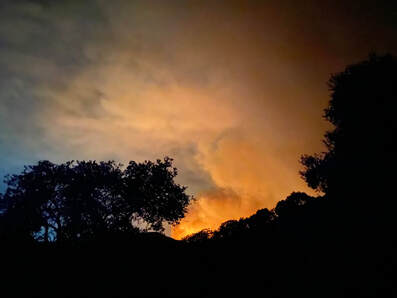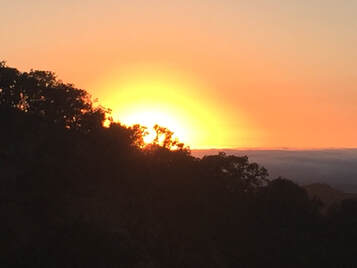 I write this from the desk in my house. A few days ago, it wasn’t at all clear if this desk and the house it’s in would still be with us now. I took the photo you see here from the deck of my house in the evening. Smoke lit up by fire, and not far away at all! That night I was up every half hour to monitor the fire’s progress. This all happened during a heat wave as well. I couldn’t open windows at night to cool things off because of how thick the smoke was. Some nights, it got down to 88 degrees F inside. Heat, or smoke to breathe, your choice. I chose heat. The cats were non-plussed! I finished building this off-grid house fourteen years ago. Knowing it was out in the sticks, I did a lot to make it fire resistant. Much of the roof is cement tile, on top of rolled roofing. It has Hardi-Shake for siding. There are no vents for embers to get into and cause problems. Handrails around the house are made of steel. The house is sprinklered inside and has a fire hydrant and hose outside. When testing out a four-inch hose, I had to point it up. Pointing down would lift me off the ground! I even have decent clearance from vegetation around most of the house. I used a hot Mapp-gas torch to test materials. FYI, Mapp burns at 3,670 F in air! Even the Trex decking sample did not sustain flame very well at all, so that’s what I used. In those fourteen years, we’ve had a lot of experience with fires and have learned some things. I was just told yesterday that firefighters are bypassing homes with Trex decks because they are considered too difficult to protect. Ug! When I built the house, keeping vegetation from being right up against the house was thought to be good, now people are saying they want 100 feet of clearance. Big ug! I think I did a pretty good job of making the house fire resistant, but I’m not emotionally detached enough to be able to look forward to seeing how well it does in a real fire. I also didn’t factor in what mandatory evacuations would be like. Law enforcement and the firefighters just don’t want you around! Someone trying to protect their home is considered a liability, or someone that probably will need to be rescued. What’s the point of having a mini fire station if you can’t/shouldn’t stay to use it? And I hadn’t considered the pressure from family and friends to get out. Knowing what’s really the right thing to do, gets harder in a fire. Consider your escape route. If you stay behind to protect your home, but eventually find that the fire is winning, do you still have a clear way out? I have a long driveway through the brush and trees. I imagine it’s no fun staring down a life or death decision like that. Fortunately, the fire stayed away, and I can sit here with only a faint smoke odor and write. But now I have a new task, which is to figure out how to make this place even more resilient and able to defend itself from fire. I suppose I’ll be cutting some trees further back, whacking down some weeds, and figuring out how to “harden” my plastic water tanks so they are able to survive a fire. Perhaps there are shutters, like they used to use in California’s gold country, that can go over windows to secure those weak spots. Maybe exterior sprinklers? And??? Our climate is changing these days, and now in California, fire season is thought to be year-round. Fires have changed also. I’ve heard firemen describing them as hotter and faster. And it’s not just the wildland fires, but fire in towns with little vegetation, have jumped from house to house to house. Seemingly resistant houses, like those covered in stucco are no longer immune. With big or fast fires, the fire crews can do little but try to get people out safely. Maybe it’s time to consider underground houses again! Whatever, we need to understand the changing science around fire and buildings so we can create truly safe, long lived and resilient homes and other structures. Fire is not going away. We are challenged to learn how to live with it. Yours, Larry
1 Comment
 Here’s a statement that likely won’t cause much debate: “Nobody’s going to believe something they think is not true”. Easy, right? Conversely, they will believe something they think is true. To me this raises the questions of “What is the truth”, and “Is it affected by beliefs?”. Is truth something solid and unchanging or does it depend on your perspective… what you believe? These days, people believe whatever they want about the corona virus and it’s spread, regardless of what “science” tells them, or how many people have died. Those who don’t want to believe the science or numbers we’re given (or those who have a different agenda, like dollars over lives) tell us that it’s all a conspiracy using fake science. But think, unless you did the research yourself, how can you know any “facts” to be true? Then, why do people choose to believe anything at all that they didn’t experience, research and learn on their own? These days, how does one justify believing only the “facts” that agree with their position, while dismissing the rest? I believe we all have the nascent ability to communicate with animals, but most people are blind to this gift. Does that make it a lie? Many people believe the pandemic is a hoax, perpetrated on all, in order to control us. Those who like to theorize about conspiracies “know” that most of the media in the US is owned by people who want to control what we think, to their own greedy and possibly evil ends. It’s all such a conflicted muddle, how do we get to the undeniable truth? Here’s a little thought experiment to find what truly is true. Look for things that cannot be disputed. Does the sun come up for you in the morning? Does it rise even if there are clouds in the way? Is the sun rising an undeniable truth? You might think the Earth is actually flat and in the very center of the universe, so everything else revolves around it. I’m not questioning any of that… only whether the sun rises each day. I’m guessing we all agree it does, though I actually haven’t gone around asking people. I can imagine their entertaining reactions if I did! What other things are unmistakably true? I’d be willing to bet a cup of coffee that you can find many more truths. I’m always on the lookout for them. After all, we know that “The truth is out there”! :~) After the “Black Death” in Europe during the fourteenth and fifteenth centuries, which killed between thirty and sixty percent of the population, it seems the people remaining desperately needed to know what was true. They needed an anchor. In the town squares, they put markers, showing the four points of the compass. This was an unarguable truth for them. Now, back to the thought experiment, round up every truth you can and make it your foundation. These are your unmistakable, undisputable truths. Others may disagree, but as you have met with and lived these truths, they can be your sun rising and your points of the compass. Some truths, like animal communication is for me, are your individual truths. They probably aren’t provable by normal scientific means at this point, so it’s not our job to be perturbed if others don’t believe these personal truths. Others just aren’t working from the same set of facts that you or I am. Simply, for me, my experience is different. It’s been fun over the years to be told some plumbing things cannot happen, when I’ve seen and worked with exactly the thing I was told was impossible. If such different viewpoints can happen with physical reality, imagine what divisiveness can happen with the rest of our universe! This brings us to an old question. How do you vet your truths? How do you know beyond doubt that they are actually true? Here we must take ego out of the equation. You cannot choose to believe something just because it aligns with what you feel is correct. Well, you can, but that doesn’t make it an undeniable truth, the sort of truth you expect others to see and believe! Is something true because a majority of sources, or the powerful say so? Nicolaus Copernicus was at odds with the Catholic Church in the 1500s because he thought Earth revolved around the sun rather than the other way around. The Church was a powerful organization and going against it was worse than fighting city hall is today. That’s because they could condemn your soul to eternal hell! Still, most people today believe Copernicus was correct, because of the mountain of evidence telling us so. If something matters a lot to you, it’s best to study it and really do the research so you can know beyond doubt that it is true… or not! It’s OK to accept what others say as long as you make sure they are credible and have no agenda other than telling the full results of their research. Put another way, look for the motivations of those proclaiming their truth. “Follow the money” is an old saying that applies here. If you deign to believe them, what do they stand to gain? Is it money, power, loyalty, fame, or simply the knowledge that they have helped? And yes, I know that this divining out the truth is a lot of work, but ultimately, it empowers you and opens doors for you that you may not even have seen before. One of my favorite quotes: “The inquiry of truth, which is the love-making, or wooing of it, the knowledge of truth, which is the presence of it, and the belief of truth, which is the enjoying of it is the sovereign good of human nature.” Francis Bacon (1561-1626) Let’s give truth the same respect that Francis Bacon did. The benefits of doing so will elevate all of us, and benefit everyone and everything living on our little planet. Yours, Larry |
Larry Weingarten
Looking back over my working life of 50+ years, it seems clear that self sufficiency has always been the best way for me to be useful. Now, mix in a strong interest in water in its many forms and the wide world of animals and you'll know what's important to me. Archives
January 2023
Categories |
Copyright © 2014 - 2023
All Rights Reserved
All Rights Reserved



 RSS Feed
RSS Feed